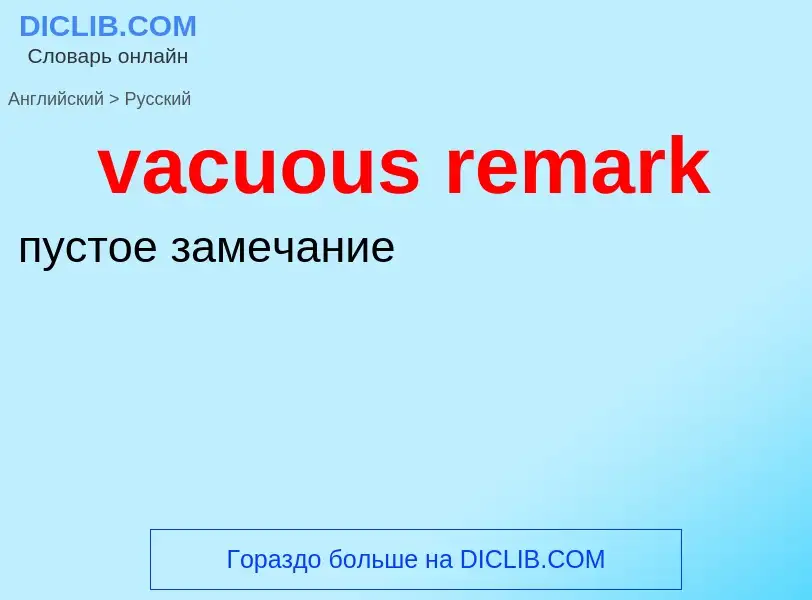Μετάφραση και ανάλυση λέξεων από την τεχνητή νοημοσύνη ChatGPT
Σε αυτήν τη σελίδα μπορείτε να λάβετε μια λεπτομερή ανάλυση μιας λέξης ή μιας φράσης, η οποία δημιουργήθηκε χρησιμοποιώντας το ChatGPT, την καλύτερη τεχνολογία τεχνητής νοημοσύνης μέχρι σήμερα:
- πώς χρησιμοποιείται η λέξη
- συχνότητα χρήσης
- χρησιμοποιείται πιο συχνά στον προφορικό ή γραπτό λόγο
- επιλογές μετάφρασης λέξεων
- παραδείγματα χρήσης (πολλές φράσεις με μετάφραση)
- ετυμολογία
vacuous remark - translation to ρωσικά
[ri'mɑ:k]
общая лексика
REM
комментарий
поясняющий текст в программе, макрокоманде или командном файле. Игнорируется при их исполнении
замечание
замечать
наблюдать
примечание
ссылка
Смотрите также
существительное
[ri'mɑ:k]
общая лексика
замечание
примечание
пометка
ссылка
наблюдение
внимание, наблюдения
глагол
общая лексика
замечать
наблюдать
отмечать
делать замечание
высказываться (о чём-л.)
"It's curious"
he remarked - «Это любопытно»
- заметил он
замечать, наблюдать, отмечать
делать замечание, высказываться
[ri'mɑ:k]
существительное
искусство
ремарка
мелкое графическое изображение
сделанное художником на полях гравюры
Ορισμός
Βικιπαίδεια
In mathematics and logic, a vacuous truth is a conditional or universal statement (a universal statement that can be converted to a conditional statement) that is true because the antecedent cannot be satisfied. It is sometimes said that a statement is vacuously true because it does not really say anything. For example, the statement "all cell phones in the room are turned off" will be true when no cell phones are in the room. In this case, the statement "all cell phones in the room are turned on" would also be vacuously true, as would the conjunction of the two: "all cell phones in the room are turned on and turned off", which would otherwise be incoherent and false.
More formally, a relatively well-defined usage refers to a conditional statement (or a universal conditional statement) with a false antecedent. One example of such a statement is "if Tokyo is in France, then the Eiffel Tower is in Bolivia".
Such statements are considered vacuous truths, because the fact that the antecedent is false prevents using the statement to infer anything about the truth value of the consequent. In essence, a conditional statement, that is based on the material conditional, is true when the antecedent ("Tokyo is in France" in the example) is false regardless of whether the conclusion or consequent ("the Eiffel Tower is in Bolivia" in the example) is true or false because the material conditional is defined in that way.
Examples common to everyday speech include conditional phrases used as idioms of improbability like "when hell freezes over..." and "when pigs can fly...", indicating that not before the given (impossible) condition is met will the speaker accept some respective (typically false or absurd) proposition.
In pure mathematics, vacuously true statements are not generally of interest by themselves, but they frequently arise as the base case of proofs by mathematical induction. This notion has relevance in pure mathematics, as well as in any other field that uses classical logic.
Outside of mathematics, statements which can be characterized informally as vacuously true can be misleading. Such statements make reasonable assertions about qualified objects which do not actually exist. For example, a child might truthfully tell their parent "I ate every vegetable on my plate", when there were no vegetables on the child's plate to begin with. In this case, the parent can believe that the child has actually eaten some vegetables, even though that is not true. In addition, a vacuous truth is often used colloquially with absurd statements, either to confidently assert something (e.g. "the dog was red, or I'm a monkey's uncle" to strongly claim that the dog was red), or to express doubt, sarcasm, disbelief, incredulity or indignation (e.g. "yes, and I'm the King of England" to disagree a previously made statement).

.jpg?width=200)

![A commemorative plaque]] in memory of Erich Maria Remarque at the Wittelsbacherstrasse 5 in Berlin, unveiled on 22 June 1972 A commemorative plaque]] in memory of Erich Maria Remarque at the Wittelsbacherstrasse 5 in Berlin, unveiled on 22 June 1972](https://commons.wikimedia.org/wiki/Special:FilePath/Erich Maria Remarque Gedenktafel.jpg?width=200)
![A commemorative plaque]] in memory of Erich Maria Remarque on [[Kaiserdamm]] [[Boulevard]] in Berlin A commemorative plaque]] in memory of Erich Maria Remarque on [[Kaiserdamm]] [[Boulevard]] in Berlin](https://commons.wikimedia.org/wiki/Special:FilePath/Erich Maria Remarque Gedenktafel Kaiserdamm.jpg?width=200)



